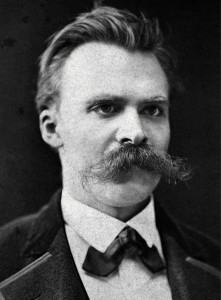The New Religion Fails to Understand the Implications of its Own ‘gospel’. (And clings to meaning.)
The new religion speak a lot about unknowing; it speaks a lot about a lack of meaning; it speaks a lot about owning uncertainty and about accepting the death of our gods – but it clings to meaning.
The new religion plays semantic games with Easter writing that the cross “plunges us into a type of deep nihilism,” and that the “Resurrection does not point to the abolishing of Nihilism, but rather of a life that robs it of its sting,” and so it clings to meaning.
We can only conclude that the new religion does not understand nihilism.
Previously we suggested that in conjuring meaning from a world which has none, and from a world which doesn’t exist, the ‘new religion’ falls at the same point as the New Atheism it critiques. In doing both it appears to have performed a slight of hand so wondrous that it has managed to misdirect even itself.
It speaks of nihilism, but clings to meaning.
 This, however (and at the risk of sounding like the new religion), is a good thing. Why? Because we see, again, that meaning is essential to life; we see that human beings are not machines, and that we have personalities. These are basic facts about ourselves and they raise questions; questions about who and why we are, and they are questions which have very few answers.
This, however (and at the risk of sounding like the new religion), is a good thing. Why? Because we see, again, that meaning is essential to life; we see that human beings are not machines, and that we have personalities. These are basic facts about ourselves and they raise questions; questions about who and why we are, and they are questions which have very few answers.
One of the answers is the one we have been discussing: that there are no answers – that the universe is what it is but is meaningless. It is, as we have seen, the professed answer of atheism and new religion. As we have also seen, however, it is an answer which can be stated but which cannot be lived.
“If a man held that everything is meaningless… and if he really held this position with any consistency, it would be very hard to refute. But in fact, no one can hold consistently that everything is chaotic and irrational and that there are no basic answers.” (Francis Schaeffer Trilogy, Here is There and He is Not Silent, page 280, IVP, pub. 1990.)
Meaning in a meaningless universe is not a consistent position. We aspire to more; we will always aspire to more. The ‘New Religion’ imports meaning and demonstrates this.
But there is something else. I’d also like to suggest that the new religion speaks of nihilism too frequently and too easily. Had it seen how opaque the darkness was it would be more careful. Had seen the absence of light that Good Friday it would not speak of it so easily, nor suggest that we can be equipped to bear the weight of the cross.
The point of the cross in Christianity is that we do not have to bear its weight. Had we borne that weight there would be no Easter Sunday for anyone.
 By way of an aside, then, and perhaps as part of our apologetics, maybe we should be careful when speaking of the ‘crosses’ we have to bear. Our lives can be terribly painful at times, and while it is correct to say that Jesus came to identify with our suffering, it is a less than full description of the ‘Lamb of God’. He faced an absence that I need not face.
By way of an aside, then, and perhaps as part of our apologetics, maybe we should be careful when speaking of the ‘crosses’ we have to bear. Our lives can be terribly painful at times, and while it is correct to say that Jesus came to identify with our suffering, it is a less than full description of the ‘Lamb of God’. He faced an absence that I need not face.
However, the new religion clings to meaning.
And the ‘Old’ Religion Knows Why.
Our aspirations point us towards something: what, or more precisely, who we really are.
We are beings with personalities, beings who seek order and meaning. We know what it is to love and we want to be loved.
It should be clear by now, however, that if we begin with a universe which has no meaning then there is no meaning; it simply isn’t there. If we begin with a universe which has no personality, nothing of that universe can have a personality. If we begin with a universe which doesn’t care and doesn’t love, then there is no love; it isn’t there; and even wishing it so is a contradiction.
In other words, a meaningless world has no answer to the human condition.
This is important. When we speak of love and personalities and meaning in a loveless, meaningless and impersonal universe then there is no other option than that which says these things have been introduced from elsewhere.
And the ‘Old’ Religion knows from where.
“Our aspirations to the reality of (all these things) are in line which what was originally there and what has always intrinsically been.” (Francis Schaeffer Trilogy, Here is There and He is Not Silent.)
 We are personal beings who love and who seek meaning not because we are made in the image of an impersonal, meaningless universe, but because we are bear the image of a personal being who loves and who speaks meaningfully.
We are personal beings who love and who seek meaning not because we are made in the image of an impersonal, meaningless universe, but because we are bear the image of a personal being who loves and who speaks meaningfully.
This is what the ‘Old’ Religion has always said: ‘In the beginning’… personal, speaking, loving, self-existent Being.
The new religion may say it finds this meaningless, but faced with what we know about ourselves, unless we also render ourselves meaningless, which we do not, then it is a logical, reasonable and rational place to start.
It is entirely reasonable to say that meaning is derived from meaning and not non-meaning; entirely reasonable to say that personality is derived from personality and not non-personality; it is entirely reasonable to say that love is an attitude derived from a loving Being and not a non-loving, non-being.
 And it is why it is rational for Puddleglum to say,
And it is why it is rational for Puddleglum to say,
“Suppose we have only dreamed, or made up, all those things – trees and grass and sun and moon and stars and Aslan himself. Suppose we have… Suppose this black pit of a kingdom of yours is the only world… that’s a funny thing, when you come to think of it. We’re just babies making up a game, if you’re right. But four babies playing a game can make a play-world which licks your real world hollow.”
Hollow.
